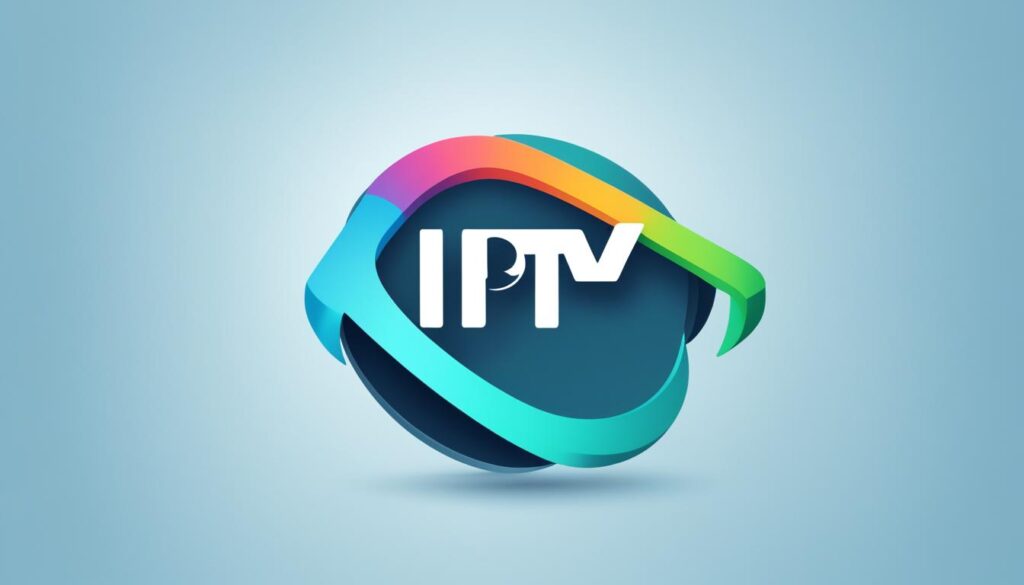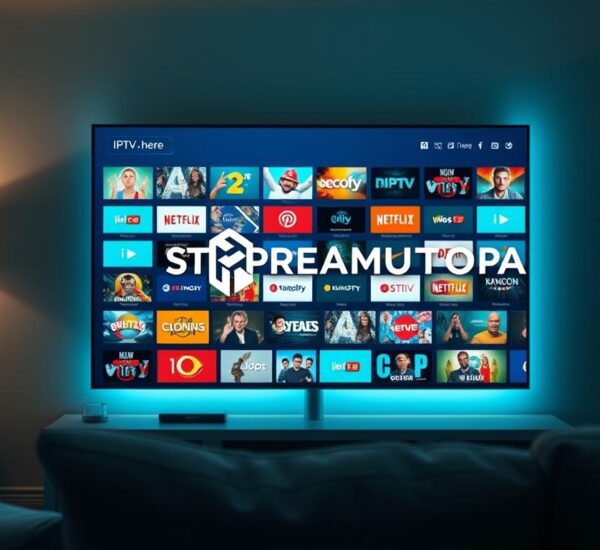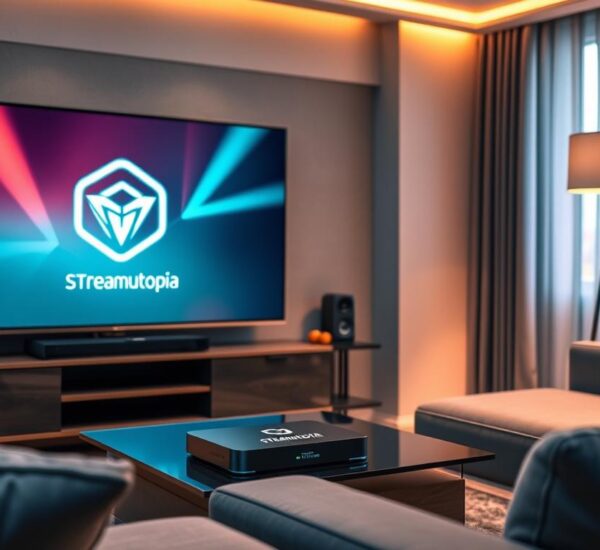Ever felt your favorite IPTV stream freeze right when the show is getting good? The annoyance of buffering can make you doubt your streaming choices. We’re here to help by explaining why IPTV buffering happens and how to fix it. We’ll cover key factors like internet speed—aim for at least 5Mbps for standard quality and 30Mbps for 4K. Let’s get into strategies for making your IPTV streams smoother and buffer-free1.
Key Takeaways
- Knowing your internet speed is key to avoiding buffering, with at least 7-10 Mbps needed for smooth IPTV2.
- Wired connections are more stable than wireless, making your streaming better1.
- Keeping your IPTV app and device updated can greatly improve performance and cut down on buffering3.
- Cleaning out your cache and cookies often can help fix streaming problems3.
- Trying different IPTV providers might give you better quality and less buffering2.
- Talking to your ISP can uncover any issues with your internet2.
Understanding IPTV and Buffering
IPTV lets users watch TV over the internet, not through old-school methods like antennas. It needs a steady internet connection to work well. The term IPTV buffering definition means loading video content ahead of time for smooth watching. If this loading doesn’t work right, streaming can get interrupted, which is really annoying.
Slow internet is often why IPTV buffers a lot4. For a good streaming experience, you should have at least 7-10 Mbps for downloads and 1-3 Mbps for uploads5. Buffering happens when there’s too much traffic online or not enough bandwidth from streaming services. So, having good internet and a reliable service provider is key.
To understand How IPTV works, know it uses buffering to cut down on playback stops. The buffer stores streamed content temporarily, helping avoid delays. If you’re seeing buffering, try restarting your router or getting closer to your Wi-Fi router for a better signal4. Also, keep your IPTV app updated to fix bugs and boost performance, which should help with buffering6.
What Causes IPTV Buffering?
IPTV buffering can happen for many reasons, making watching shows hard. Slow or unstable internet is a big cause of causes of IPTV buffering. Weak Wi-Fi signals make it worse7. When lots of people watch at the same time, it can slow down the stream7. For the best IPTV experience, you should have at least 5–10 Mbps for standard quality and up to 30 Mbps for 4K.
Other things can also affect how well IPTV works. For instance, some software versions can cause buffering problems. Users found issues with live TV on Kodi versions 4.2.2 and 17.6, but recordings worked fine8. Keeping your software up to date helps avoid these problems.
Choosing the right streams can also make a difference. Using .ts streams instead of .m3u8 can help reduce buffering8. Knowing about these IPTV streaming issues lets users fix them and enjoy their shows better.

| Issue | Impact on Streaming | Suggested Solutions |
|---|---|---|
| Slow Internet Connection | Increased buffering and interruptions | Upgrade bandwidth or check connection quality |
| Network Congestion | Buffering during peak hours | Stream during off-peak times |
| Hardware Limitations | Inconsistent streaming quality | Upgrade media devices |
| Use of Wi-Fi | Higher chances of interference and instability | Switch to wired connections |
| Streaming Protocols | Variable buffering depending on stream type | Prefer .ts streams for live feeds |
Fixing these main factors affecting IPTV performance can help reduce buffering. This makes streaming more reliable8.
Tips for Reducing IPTV Buffering Issues
Start by checking your internet speed to fix Tips for Reducing IPTV Buffering Issues. Make sure your internet is fast enough for streaming. You need at least 20 Megabits per second (Mbps) for standard definition (SD) streaming. For high definition (HD), you’ll need 40 Mbps or more9.
If your internet speed is too low, you might see lag on HD channels10. This can ruin your viewing experience.
Check Your Internet Connection Speed
It’s important to check your internet speed often. Use online speed tests to see how fast your download and upload speeds are. Overloaded wireless routers can slow down your internet speed, making streaming less smooth10.
Determine Optimal Internet Speed Requirements
Knowing the right internet speed is key. For SD content, you need 5-10 Mbps. For HD, aim for 20-25 Mbps9. These speeds help you optimize internet speed for IPTV and reduce buffering.
If you want to stream in full HD or higher, your internet speed should be at least 40 Mbps9.
Use a Wired Connection for Stability
Choosing a wired connection is key for wired connection stability when watching IPTV. Those who use Ethernet cables often find fewer interruptions than Wi-Fi users. This method cuts down on interference from things like walls or other electronic devices that can mess with wireless signals.
Benefits of Ethernet Over Wi-Fi
Ethernet has big advantages for IPTV, especially for streaming high-definition content. It’s important to have at least 10 Mbps internet speed for a smooth IPTV experience11. A wired connection usually gives you more consistent speeds, which is great for this.
It also means less chance of buffering and freezing, especially when lots of people are online at the same time5. With a wired setup, you can watch streaming without interruptions. It sends data faster and has lower delay times.
If your internet speed is too low, IPTV might not work well, causing more buffering problems11. To make sure your internet is good enough, you can do speed tests11. Also, updating your devices and hardware can make IPTV work better, reducing problems from slow connections or old tech1.
Restart Your Modem and Router
Restarting your modem and router is a simple yet powerful fix for streaming problems. This action, known as power cycling, clears out temporary issues that can slow down your network. It’s easy to do and means unplugging your modem and router for about 30 seconds. This lets your devices reset and reconnect with your Internet Service Provider (ISP).
How to Power Cycle Your Devices
To Refresh your network connection, just follow these steps:
- Unplug both your modem and router from their power sources.
- Wait for about 30 seconds to let the devices fully reset.
- Reconnect the modem first and wait for it to boot up completely.
- Plug in your router and let it connect.
- Once all lights show a stable connection, test your IPTV service again.
This method can fix problems like freezing, buffering, and poor video quality. In fact, about 80% of freezing issues on devices like Amino and Entone are solved by restarting or checking Ethernet connections12. By restarting your modem and router now and then, you can keep your network running well. This ensures a better streaming experience with services like Streamutopia, which offers great quality and quick customer support13.
Close Background Applications
To make your IPTV streaming better, it’s key to stop apps that use a lot of bandwidth in the background. These apps often include things like downloads, updates, and streaming that can slow down your IPTV. Closing these apps helps manage your IPTV bandwidth, especially during busy times, like 6 to 11 p.m., when networks get crowded14. By closing unused apps, you can make more data available for streaming without interruptions.
Identifying Bandwidth-Hogging Applications
Many devices run apps in the background that can hurt your streaming quality. For example, streaming HD videos can take about 900MB of data per hour. If you have many apps open at once, you can quickly use up all your bandwidth14. It’s important to watch your device’s data use because changes in download speed can cause buffering10.
Here’s a simple checklist to help you find apps that use a lot of bandwidth:
- Look at what apps are running on your computers, phones, and smart TVs.
- Use apps to test your Internet speed to see if it’s good enough, ideally over 40MBps.
- Close any browser tabs you’re not using to save bandwidth.
- Restart your streaming device to clear out background processes.

Stopping background apps can greatly improve your IPTV’s performance, making it smoother to watch.
Explore more tips for optimizingyour IPTV experience
To avoid lag while watching videos, keep an eye on and manage your connections well. This ensures a smooth viewing experience1410.
Adjust Your Video Quality Settings
Lowering your video quality can help reduce buffering. Many users face buffering issues due to network overload. Reports show buffering happens every 7 to 10 seconds, making watching videos frustrating15. To fix this, try lowering your stream’s resolution when buffering doesn’t stop.
Streaming in lower quality can ease the load on your internet, making watching smoother. Some users found that changing streaming formats helped too16. By focusing on a steady playback, you can watch your favorite shows without interruptions.
For more tips on improving your IPTV player, check out this guide on installing an IPTV player on an Amazon Fire TV Stick here. These steps can help you enjoy smoother playback and get the best from your IPTV service.
Consider Using a VPN for Better Performance
Using a VPN for IPTV can make streaming better. It hides your internet use from ISPs, stopping them from slowing down your connection. This helps avoid buffering problems. VPNs also boost security and make your connection faster.
How VPNs Help Reduce Buffering
Premium VPNs might slow down your internet a bit, by 10-20%17. But, the right VPN can actually make IPTV stream faster. It’s best to connect to servers near you for faster speeds17.
Connecting to servers in places like the Netherlands or Los Angeles can help6. Using the WireGuard protocol is also a good idea, as it’s the fastest17.
Choosing a well-known VPN, like ExpressVPN, is a smart move. It has fast servers and offers a 30-day money-back guarantee1. You’ll need at least 7-10 Mbps for downloads and 1-3 Mbps for uploads for smooth streaming with VPN6.
Using MultiHop (Double VPN) can also make your connection more stable and fast17.
Choosing the right VPN and a strong internet connection can greatly reduce buffering. This makes your IPTV watching better.

Check Your IPTV Service Provider’s Status
It’s key to check the IPTV provider’s status for a smooth streaming experience. Often, buffering problems come from the provider’s end. Having a reliable service is key for service provider reliability and enjoying clear streams. Keep an eye on status updates or forums to see if others are facing the same issues.
For fixing IPTV service problems, knowing the recommended internet speeds is crucial. For basic streaming, you need at least 5 Mbps. For 720p HD, you should have at least 10 Mbps1. Slow speeds can cause annoying buffering and disconnections during key moments. It’s important to have a provider with strong server quality for uninterrupted watching.
To improve your streaming, check your modem and router often. They should be turned off and on every 30 seconds to refresh your connection and avoid interruptions3. Doing these checks helps you fix problems before reaching out to your IPTV provider.
Update Your IPTV App and Device
It’s key to keep your IPTV app and devices updated for the best performance. Regular updates boost the streaming service’s functionality and reduce buffering and freezing. These updates include important IPTV app updates and device firmware updates. They are crucial for reliable streaming quality.
Importance of Regular Updates
Checking for updates often is a must to keep IPTV systems current. Updates fix bugs and improve the user experience. For example, the latest IPTV app version can solve buffering issues.
Outdated device firmware can also affect streaming quality. Manufacturers release device firmware updates to enhance hardware and improve streaming service compatibility. Not keeping up with these updates can disrupt your viewing.

Reviewing your IPTV app and device settings regularly is a good idea. It helps you find updates and make necessary adjustments for smooth streaming. Users can visit this page for quick support on updating their services.
| Update Type | Description | Frequency |
|---|---|---|
| IPTV App Updates | Enhancements and bug fixes to improve streaming performance | Monthly |
| Device Firmware Updates | Updates to optimize device performance and compatibility | As released |
| General Software Engineering | Regular maintenance checks for optimal functionality | Quarterly |
Keeping your IPTV app and device updated ensures a reliable streaming experience with fewer interruptions. Regular updates improve your IPTV service’s performance, leading to uninterrupted viewing1.
Clear Cache and Cookies Regularly
Clearing the cache and cookies in your IPTV app is key for top-notch performance. Over time, too much cache can slow down your device. So, it’s important to clear IPTV app cache to boost streaming quality. Regular upkeep for IPTV apps helps keep your service smooth and cuts down on buffering, making for a better watch.
Devices like FireStick, including the FireStick 4K and Fire TV Cube, need regular cache clearing to stay efficient. Cache buildup often comes from storage issues, causing apps to run slow and stream poorly. Regular maintenance solves app problems and boosts security, making it a must-do for users.
To manage cache on your FireStick, just follow these steps:
- Navigate to Settings
- Select Applications
- Choose Manage Installed Applications
- Pick the app you want to clear
- Click Clear cache
This action wipes the cache to zero, greatly improving your IPTV app’s performance. Doing this regularly can lead to better streaming and happier users. So, keeping your app’s cache in check is key to great streaming. Don’t skip it1819.
Explore Alternative IPTV Providers
If you’re still facing buffering problems after trying different solutions, it might be time to look at other IPTV providers. Doing an IPTV provider comparison can show you who offers the best streaming quality and support. By 2024, IPTV is expected to take over 33.7% of the market, beating traditional cable in many homes20. This shows IPTV is getting more popular in places like Central and Eastern Europe, Sri Lanka, and Nepal20.
When looking for the Best IPTV services, think about the number of channels, streaming quality, and how easy it is to use. For example, ReflexSat IPTV has over 21,000 channels and supports 4K streaming with VPN. IPTVukonline gives you access to more than 19,000 channels from 42 countries, making it easy to use and reliable21.
It’s important to find a reliable IPTV service. Look for features like Video on Demand (VOD), Electronic Program Guides (EPG), and the ability to watch on multiple devices. IPTVHouse and ViralIPTV offer a lot of channels and 24/7 customer support21. Choosing legal IPTV providers like Hulu and YouTube TV means you get legal content and support, which can make your viewing better.

Contact Your ISP for Support
If you’re still seeing buffering after trying other fixes, it’s time to contact your Internet Service Provider for help.
ISPs are key in solving problems that affect your IPTV streaming experience. They can look into issues like ISP throttling, which can cause buffering and poor quality.
To troubleshoot with your ISP, test your internet speed. For standard quality streaming, you need at least 5-10 Mbps. HD quality requires 20-25 Mbps1. If you’re unsure, ask your ISP if your speed is good enough.
If problems keep happening, don’t hesitate to ask for ISP help. They might suggest changes or upgrades to improve your IPTV streaming. This can lead to a better streaming experience in the long run.
Evaluate Your IPTV Hardware and Software
For the best streaming, check your IPTV hardware often. Old or broken devices can cause buffering problems. Make sure your IPTV hardware is up to date and fits your streaming needs. For example, set-top boxes can handle about 7 Mbit/s each, with a max of 4 streams at once, using about 24 Mbit/s22.
Also, make sure your streaming devices are updated and work well with IPTV apps. Checking your IPTV software regularly can spot issues early. For example, a single stream usually uses less than 10 Mbit/s, showing how important bandwidth is for smooth streaming22.
Watch how much bandwidth you use too. At 10 Mbit/s, you start losing packets, causing a 0.32% loss rate. This gets worse with more use22. Knowing this can help fix your IPTV and improve your watching experience.
Optimize Your Home Network Setup
To improve home network for IPTV, you need to set it up right. Place your router in the middle of your home to cut down on interference and boost the Wi-Fi signal. This helps make your network better for streaming services that need a strong connection. Using a wired connection is often best for IPTV because it’s more stable than wireless.
Experts say you need at least 5Mbps for standard quality, 10Mbps for 720p, 20Mbps for 1080p, and 30Mbps for 4K streaming1. If your IPTV keeps lagging, it might be because you don’t have enough bandwidth or there’s a problem with your service provider1. During busy times, congestion can really slow things down23.
To make things better, set your IPTV to use most of the bandwidth. This means other devices won’t slow down your stream. Try to use fewer devices on your network when you’re streaming. Using Quality of Service (QoS) settings on your router can also help make sure IPTV gets priority23. Sometimes, updating your router and modem can also make your streaming smoother. If buffering keeps happening, you might want to look into switching IPTV providers for a better experience.
Conclusion
Fixing IPTV buffering is easy with some smart steps to make streaming better. First, make sure your internet speed is fast enough for HD content. A minimum of 16 Mbps is needed24. Also, using a wired connection can make your stream more stable, helping to avoid buffering issues25.
To cut down on buffering, clear your cache and cookies, update your IPTV devices, and check your IPTV service status26. Knowing these tips helps stop interruptions and makes watching shows smooth. This way, you can enjoy your favorite shows without any trouble.
If you’re still having trouble, try a trusted IPTV provider like StreamUtopia.com for better streaming to enhance your IPTV experience. Using these tips can make your streaming experience better and more fun26.
FAQ
What is IPTV, and how does it work?
What causes IPTV buffering?
How can I check my internet connection speed?
Why is a wired connection preferred for IPTV streaming?
What should I do if I experience persistent buffering?
How can I reduce buffering by managing my applications?
Can using a VPN help improve IPTV performance?
How often should I update my IPTV app and devices?
What should I do if my IPTV app is running slow?
How can I enhance my home network setup for better IPTV streaming?
Source Links
- How to Fix IPTV Buffering and Freezing Issues (2024) – https://www.firesticktricks.com/iptv-buffering-and-freezing.html
- What is IPTV? How To Solve IPTV Buffering or Freezing? – http://fmuser.org/news/IPTV-encoder/How-to-solve-Iptv-freezing-or-sound-issues/
- How do I fix my IPTV from buffering/freezing? – https://medium.com/@dias226/how-do-i-fix-my-iptv-from-buffering-freezing-580b0f58b273
- How to Fix Constant Buffering on My Smart IPTV App – https://medium.com/@buyiptvm3u/how-to-fix-constant-buffering-on-my-smart-iptv-app-7a81f64b59ec
- Troubleshooting IPTV Freezing and Buffering Issues – https://digitalizard.com/why-my-iptv-freezes-and-buffers-digitalizard/
- IPTV keeps Buffering? Causes, Fixes, and Prevention Tips – https://staticiptv.us/iptv-keeps-buffering/
- IPTV Buffering: Causes and Solutions – Xtrix TV – https://xtrixtv.co.uk/fix-iptv-buffering/
- IPTV channels freeze within a minute in Kodi – https://forums.nextpvr.com/showthread.php?tid=58467
- Fix IPTV buffering and throttling – https://www.fastip.tv/iptv-buffering
- How to stop IPTV Buffering – A Definitive Guide – https://freedom-stream.com/how-to-stop-iptv-buffering/
- How to Fix IPTV from Buffering and Freezing: Tips and Tricks – https://medium.com/@buyiptvm3u/how-to-fix-iptv-from-buffering-and-freezing-tips-and-tricks-e3a278c2497b
- IPTV Freezing | Phonoscope Fiber – https://www.phonoscopefiber.com/help-center/iptv-freezing
- Troubleshooting Your IPTV Connection: Tips and Support for Uninterrupted Streaming – https://getmaxtv.com/iptv-troubleshooting-and-support/
- How to Stop Buffering: Learn to Prevent Internet Video Buffering Issues | SatelliteInternet.com – https://www.satelliteinternet.com/resources/how-to-stop-buffering/
- How can I stop Apple TV from buffering? – https://discussions.apple.com/thread/254764864
- M3U channels constantly stuttering/buffering – https://community.getchannels.com/t/m3u-channels-constantly-stuttering-buffering/33415
- Slow VPN? Try these 8 tips to speed it up – Surfshark – https://surfshark.com/blog/tips-on-how-to-boost-vpn-speed
- How to Stop Kodi Buffering Issues (3 Fixes Still Working in 2024) – https://www.comparitech.com/kodi/stop-kodi-buffering-problems/
- How to Clear Cache on FireStick for Smooth Streaming – https://www.firesticktricks.com/clear-cache-on-firestick.html
- Top 24+ Best IPTV Service Providers For 2024 (Compared & Reviewed) – https://www.vplayed.com/blog/best-iptv-services/
- 15 Best IPTV Service Providers Subscriptions (Top Subscription) – https://www.linkedin.com/pulse/15-best-iptv-service-providers-subscriptions-top-omar-bidmin-h08qe
- How to diagnose streaming performance issues? – https://forum.openwrt.org/t/how-to-diagnose-streaming-performance-issues/5728
- Home Hub 5A: IPTV streaming problem – https://forum.openwrt.org/t/home-hub-5a-iptv-streaming-problem/20036
- Understanding the Causes of IPTV Buffering and How to Fix It – British IPTV #1 Best IPTV Subscription UK | Non-Stop Sports – https://british-iptv-subscription.uk/understanding-the-causes-of-iptv-buffering-and-how-to-fix-it/
- IPTV Buffers All The Time – Tips for Smooth Streaming | StaticIPTV – https://staticiptv.co.uk/iptv-buffers-all-the-time/
- IPTV Troubleshooting: Common Problems and Solutions – aerostreams – https://aerostreams.com/2024/01/09/iptv-troubleshooting-common-problems-and-solutions/






